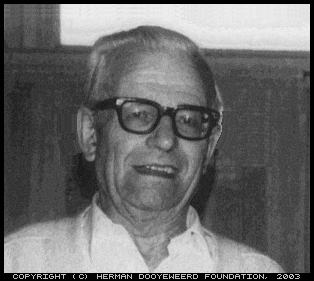Herman Dooyeweerd - Biographical Details

Herman Dooyeweerd: Philosopher, Musician, Lawyer, Christian.
See also 'Herman Dooyeweerd, The Man', which gives a portrait of his character and development drawn from the Tribute to Dooyeweerd by the late Even Runner, and also provides an 'everyday' view of his academic activity.
Brief Biographical Notes
These biographical notes draw upon Henderson's excellent Illiminating Law: The Construction of Herman Dooyeweerd's Philosophy.
- Born October 7th, 1894 in Amsterdam
- the single boy in the family, among five sisters
- to parents, Hermen (sic) and Maria, who were devout Christians.
- Herman consciously embraced this faith as a young man, and it influenced him deeply throughout his life.
- Intellectual environment in which he grew up: Dutch neo-Calvinism, of the type espoused and developed by Abraham Kuyper.
- University: Vrije Universiteit in Amsterdam, 1912-1917. Studied Law, though initially wanting to study literature of music.
- Somewhat disappointed by "lack of firmness, unity and depth of the [neo-Calvinist] position answering to the pressures and problems of the time" [H:18] conveyed by his teachers. "Up to now all we possess is fragmentary work ..." [H:18].
- Influenced by Prof. Anema towards a critical attitude not only to other traditions but also to his own tradition of thought, and Prof. Fabius towards maintaining consistency to principles. "Fabius and Anema can be thought of as representing two poles in Dooyeweerd's thought. While Fabius represented permanence and structure, Anema represented history, chance and unfolding process." [H:21]
- Ph.D. dissertation, completed 1917: De Ministerraad in het Nederlandsche Staatsrecht [The Cabinet in Dutch Constitutional Law].
- From student days, and then throughout life, influenced by, and worked with, his colleague and brother-in-law, D.H.Th. Vollenhoven.
- -1918 work in tax office, Haarlingen, Friesland.
- 1918: legal advisor for municipal government in Leiden.
- 1919-22: post at Health Office, Dept. of Labour, The Hague, examining draft legislation.
- 1920: growing concern over spheres of legal jurisdiction; started studying the general history of philosophy, "to better understand the answers contemporary schools of philosophy of law were giving to the problems .. which he had met." [H:26-7]
- 1922 approx: 'discovery' of the idea of law-spheres (aspects).
- 1922-6: Worked at the Kuyper Institute, The Hague; a time of intense study and writing, during which the idea of law-spheres was worked out.
- 1926: Appointed as professor in Faculty of Law at the Vrije Universiteit, Amsterdam.
- 1926: 'First Lecture', in which he
"briefly tells his students how he became acquainted with the consecutive schools of legal philosophy, viz. Stahl's 'historicism', Ratzenhofer's sociological theory of law, Krabber's 'psychologism', Stammler's 'logicism' and Radbruch's ethical 'value' theory. Each of these proclaimed or resulted in making one factor the true basis or source of legality (legal norms). Seeing each theory presented like this, he says, made him conscious of 'a conflict, a peculiar collision between the different areas of knowledge.'" [H:30]
- 1926-35: Developing his theory.
- 1935-6: Publication of first version of magnum opus De Wijsbegeerte der Wetsidee, 3 volumes.
- (other information to be added: marriage, war-time, etc.)
- 1953-8: Publication of second version of magnum opus A New Critique of Theoretical Thought, 4 volumes.
- (other material to be added)
- 1977: Deceased.
Dooyeweerd's Thinking:
As Volume IV of Dooyeweerd's [NC] shows, Dooyeweerd is probably one of the most widely read philosophers the world has known. His reading covered many Greek thinkers, from the pre-Socratic period and through the next 10 centuries, including Anaxogras, Anaximander, Hesiod, Pythagoras, Heraclitus, Parmenides, Socrates, Plato, Aristotle, and the schools, such as the Alexandrists, Atomists, Epicureans, Orphists, Sophists. He read Scholastic thinkers like Augustine, Anselm, Aquinas, Albertus Magnus, Althusius, Averroës, Avicenna, Blondel, Duns Scotus, Macchiavelli, Marsilius, Melanchton, and Occam. He read Reformation thinkers like Luther, Calvin, Grotius, and thinkers from the Renaissance onwards, such as Galileo, da Vinci, Newton, Leibniz, Hobbes, Locke, Berkeley, Hume, Descartes, Rousseau, Schiller, Spinoza, Voltaire, and Wolff. He read Kant in depth, and Hegel. Nineteenth Century thinkers include Cassirer, Comte, Dilthey, Driesch, Durkheim, Husserl, Kroner, Maimon, Natorp, Nietzsche, Rickert, Darwin, Fichte, Freud, Kuyper, Marx, Scheler, Schelling, Shaftesbury, Simmel, Spengler, Tönnies, Troeltsch, Weber and Windelband. Thinkers of the 20th century include Barth, Bavink, Bergson, von Bertallanffy, Beseler, Binder, Brunner, Buber, Einstein, Graebner, Haering, Hartmann, Heidegger, Heisenberg, Helmholtz, Herder, Jaspers, Lask, Litt, Lowie, Margaret Mead, Münch, Mussolini, Pfänder, Rickert, Riehl, Russell, Schmidt, Spann, Stoker, Vierkandt, Vollenhoven, Voltereck, Whitehead. These are in addition to scores of legal theorists, political theorists, and many in most of the sciences. As far as possible, Dooyeweerd read these thinkers in their original languages, since he we proficient in Greek, Latin, German, French, English as well as Dutch, and he sought to understand each in their own terms, in terms of what was meaningful to them at their own time.
Interestingly, his discussion of American Pragmatists like Peirce or James is almost non-existent -- a major gap. He was of course too early to read thinkers prominent today, like Habermas, Giddens, Foucault, and Bourdieu, so with such philosophers we must ourselves apply his methods if we find them useful.
See the pages that compare Dooyeweerd with other thinkers.
This is part of The Dooyeweerd Pages, which explain, explore and discuss Dooyeweerd's interesting philosophy. Questions or comments are very welcome.
Compiled by Andrew Basden. You may use this material subject to conditions.
Written on the Amiga with Protext.
The picture was created by Andrew Basden for the Herman Dooyeweerd Foundation from a photograph supplied by Magnus Verbrugge.
Created: 16 May 2003.
Last updated: 19 May 2003 notes added. 26 April 2013 removed 'page started' and defunct link to "http://home.planet.nl/~srw/inf_e.htm", new intro. 3 September 2015 corrected '../'; rid counter; new .nav. 13 October 2016 list of thinkers Dooyeweerd read. 22 Jan 2025 canon, bgc.

